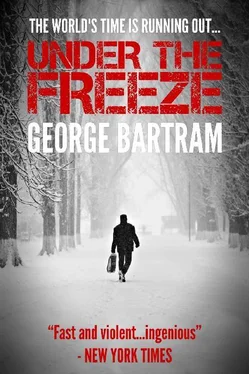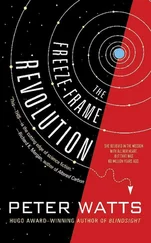“ Monsieur ?” Tarp said. The man was several inches shorter than he, ruddy-faced and white-haired, almost Dickensian in the good cheer of his smile and his eyes, which were looking at him from a network of wrinkles and folds created by a lifetime — or so it seemed — of laughter. Tarp’s one word of French had thrown him into confusion, however, for he looked bereft and began to stammer in an atrocious French accent, “Oh, uh, ah — hmm… Oh, j’ai dit — oh, damn — monsieur … j’ai dit que … les femmes — files … Oh, dammit, this is no good. Um, beauté … beauté ? Isn’t that a word, beauté ?”
“Would you prefer that we speak English, monsieur?”
The old man’s smile returned instantly. “Jolly good!” He chuckled. “Ain’t I a dreadful linguist, though. Ah? Ain’t I?” He chuckled. He crowed with delight at his own shortcomings. “What a horror! Yes, yes.” He shifted his champagne glass from his right hand to his left and held the right one out. “Pope-Ginna.”
“Jean-Louis Selous.” Tarp was thinking that he had seen the old man before. There was nothing much to the memory, something fleeting and inconsequential. He gave it up and squeezed the hand, thinking, What a lucky accident to meet such a pleasant man . Except that there are no accidents .
“You’re the journalist,” the old man said. “Ha-ha! See? I don’t miss much. How old d’you think I am? Never mind; you’d be off by years, everybody always is. What I say is, don’t guess, because if you’re wrong you’ll be embarrassed, and if you’re right, I’ll be humiliated. Ha-ha! I’m seventy-nine.”
“That is amazing, monsieur.”
“Well, it’s gratifying, anyway. Still able to guzzle the bubbly and cast a weary eye over the young ones. Eh? Eh? Ha-ha!” He patted Tarp’s arm. “Jock said he was going to have a journalist here. Didn’t say you’d be French, though. Damned unusual. Not being French, I mean — him having a journalist. Normally, for Jock, that isn’t on. I mean, it just isn’t on .” He leaned closer and dropped his voice. “Between you and me and the gatepost, m’syer, he ought to do it more often. Open himself up to the world. Eh? Eh? Of course he should.” He leaned away and looked over toward Schneider. “A raving, absolute beauté !” He was looking at a woman with Schneider. “What sort of journalist are you?”
“Of sport and entertainment.”
“Hmm.” The old man looked him up and down uneasily.
“I mean, I do not engage in personalities, monsieur.”
“Ah, aha. Hmm. Good thing, too. Lot of nasty stuff about these days, what? Frightful stuff gets published — prowler in the queen’s bedroom, all that. Some things better kept under one’s hat, eh?”
“Or under the Crown.”
“What? Oh, I see. Yes. Under the Crown — ha-ha, damned good.”
The old Englishman began to point out a few people in the room, describing them and their importance. He seemed very impressed by wealth and seemed able to give the size of other men’s wealth in dollar amounts. He lingered by Tarp; it might have been politeness, but Tarp felt it was something more. He introduced him to three men, waving them over in order to do so. It was as if he had been put there as an official greeter. Tarp glanced at Schneider to see if there was any coaching coming from that direction, but Schneider seemed busy with one of his “butlers.”
“Millions in this room,” Pope-Ginna was saying. “Millions. Interesting, when you think about it. Do you ever write about money, m’syer?”
“Only insofar as people who take part in sport have money.”
“Mmm. Never found sport very interesting, myself.” Pope-Ginna was sipping another champagne and seemed even more red-faced than before. He was watching Schneider now.
“You are close to Monsieur Schneider?” Tarp said carefully.
Pope-Ginna guiltily looked away. “Close? No, not as you’d say close . Know him to talk to. Share a bit of business wisdom with him now and again. We sit on a board or two together.”
Tarp looked at Schneider. Two of the “butlers” were standing near him at that moment, and perhaps it was that juxtaposition that caused him to remember where he had seen Pope-Ginna. He had had medals on his chest, and he had been with Schneider in Havana. He looked at Pope-Ginna again. “You are English, monsieur?” he said.
“’Course I am, and damned proud of it. Now you’re going to ask me about the Malvinas thing, I suppose, but please don’t .” The old eyes, their look of jealousy gone now, darted toward him, then almost disappeared into their frame of laugh lines. “I’ve dealt with journalists before, you see, ha-ha, ha-ha.”
“But you are an Argentine resident.”
“Oh, absolutely.”
“There are many English residents in Argentina?”
“A colony of us, yes, a colony of us. It’s such a lovely country. The best country in South America!”
“So everyone says.”
“It has its faults, but what country hasn’t? I mean, a man can’t live in England anymore. What? I mean, the taxes!”
“Are there many Russians here, monsieur?”
“What? Russians? Certainly not.”
“I thought that certain overtures were made during the Malvinas war…”
“We have some trade connections, naturally. Argentina is more or less a nonaligned country. Yes, we have some connections. Trade connections.”
“One hears rumors of Russian weapons here since the Malvinas war. Would they be credible, do you believe, monsieur? Even atomic weapons, it is said — from Russia…”
“Poppycock!” Pope-Ginna was very red in the face. “You said you aren’t that kind of journalist, there you are spouting rubbish. Pardon me, m’syer, but I have to say it. It’s rubbish.”
“Argentina has no interest in atomic weapons?”
Pope-Ginna’s eyes seemed to swell, as if they were going to burst. “Jock’s absolutely right not to invite journalists to this place. Especially when they spout damned rubbish!” And he spun around and toddled off, moving a little from side to side like a penguin.
Well! tit for tat , Tarp thought. He believed that Pope-Ginna had sought him out, perhaps knowing who he really was. Or perhaps he was one of those people who, Schneider had said, would be “looking him over.” At any rate, if Tarp had wanted to get a response from him, he had certainly succeeded.
Tarp talked with other people. A number of sober, rather dour men introduced themselves, each saying he was “a business associate of Señor Schneider’s,” as if it were a formula that had been taught to them. Tarp felt now that he very certainly was being looked over, as if he were a prospective groom meeting the bride’s family for the first time. The dour men introduced him to young women whose names they pronounced with great precision, as if to make it clear that Señorita So-and-so was not married. Tarp danced with them and quickly concluded that they were there as part of the entertainment.
At eleven, Schneider came to his side.
“People tell me you are a very serious man, monsieur,” he said.
“I thought I had been quite congenial.”
“You have been described to me as a man who lets other people put their feet in their mouths.”
“Did Señor Pope-Ginna say that?”
“Señor…? Ah, Admiral Pope-Ginna.”
“Admiral! Yes, I thought I saw him with military decorations. In Havana.”
He thought that Schneider’s forehead wrinkled just a little at that, but at that moment one of the “butlers” came near and bent to offer Schneider a tray of hors d’oeuvres. Some look passed between the two men, and Schneider’s mood seemed to change. Tarp glanced at the servant, who looked to him like a probable veteran of at least one African war. A merc , I swear he’s a merc . Nice people Schneider hires .
Читать дальше












